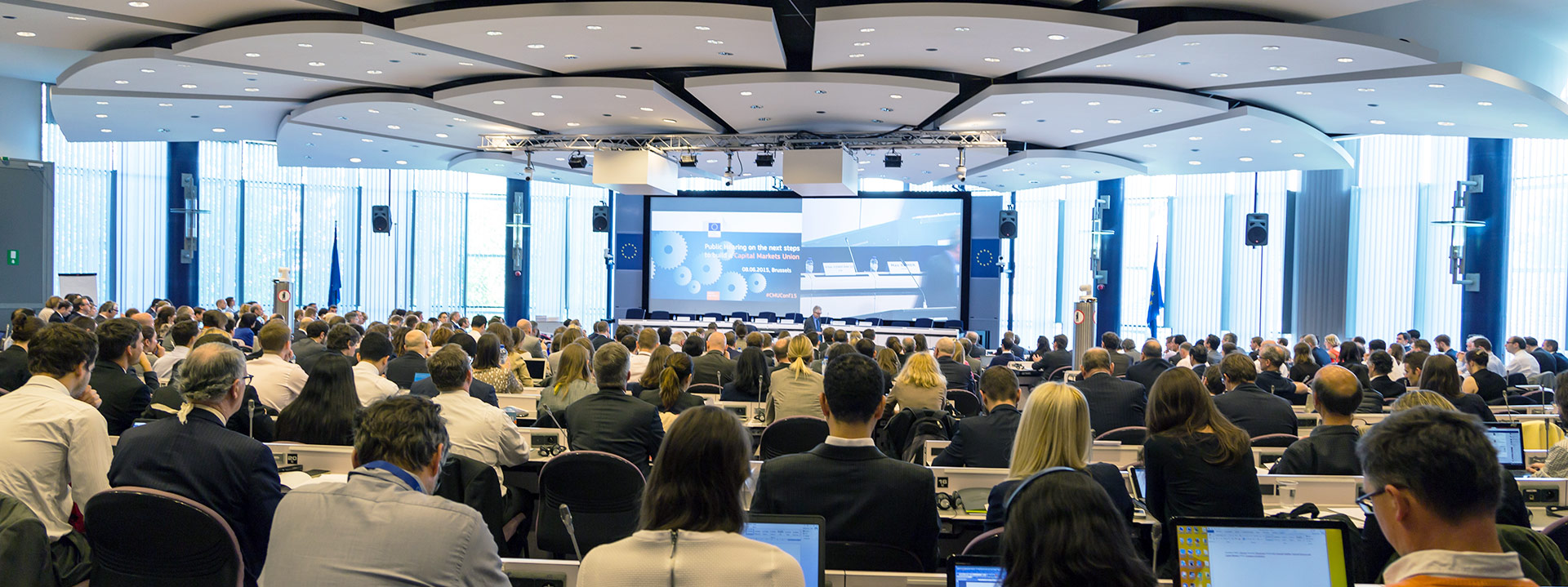In the spotlight: Public hearing on Capital Markets Union

date: 25/06/2015
Earlier this month, the European Commission organised a public hearing in Brussels to discuss its Capital Markets Union project and debate the next steps. The event drew 450 people from across Europe from all stakeholder groups. It followed closely on the heels of a public consultation the Commission launched at the beginning of 2015. The consultation responses, over 700 in total, will help the European Commission determine the short-term, medium-term and longer-term actions needed to better develop capital markets in Europe.
A project for all Member States
In his opening speech, Commissioner for Financial Stability, Financial Services and Capital Markets Union Jonathan Hill stressed that the consultation has helped confirm that the Commission is focusing on the right areas for action. He said the responses show that ‘we have identified the right issues. That we are right to be taking a step-by-step approach’.
Lord Hill also emphasised that this is a project for everyone. ‘Alongside the formal consultation, we have been travelling across Europe to talk to politicians, consumers, business start-ups, regulators, the financial services industry and investors large and small,’ he said. ‘This is a classic single market project for all 28 Member States.’ He also pointed out that ‘it is those countries without established financial centres whose businesses and investors could benefit the most.’
Key challenges and priorities
The first panel was moderated by Olivier Guersent, Deputy Director-General of DG Financial Stability, Financial Services and Capital Markets Union. The panellists agreed that the Capital Markets Union should include tailored actions, accounting for the different requirements of the Member States and the mixed starting points in terms of the level of their capital markets. In terms of short-term priorities, there was wide support for the review of the prospectus directive and the development of a framework for simple, transparent and standardised securitisation. The session also highlighted venture capital as a key area to develop to better support the needs of high-growth innovative companies.
Access to finance
The second panel was moderated by Hugo Dixon, columnist for Reuters and the International New York Times. The panellists agreed that, while traditional bank lending will continue to play a vital role, other sources of finance will be also important, to complement the bank funding and to help fill the funding gaps of many companies across Europe. Crowdfunding and peer-to-peer lending were highlighted as two sources of great potential for providing finance to small businesses - that do not have access to venture capital funds or banks. The panellists also stressed the need to simplify administrative requirements and address the tax bias in favour of debt compared to equity.
Sources of funding
This session was moderated by William Wright, the founder and Managing Director of the forum and think tank, New Financial. The panellists agreed that to rebuild the trust of retail investors in capital market investing, better financial education and guidance is needed. They stressed that increased transparency would improve the cost and performance of packaged retail investment products and recognised the potential value of the new Key Information Document (KID). The panellists also underlined the vital role of pension funds in capital markets, as natural long-term investors in capital markets.
Improving investment environment
Thomas Wieser, chairman of the Economic and Financial Committee, moderated the final panel on improving the investment environment (‘fixing the plumbing’). The Commission was encouraged to revamp efforts to tackle structural barriers that had existed long before the crisis and are now becoming entrenched in national capital market regimes. They mentioned, for example, diverging insolvency and tax regimes across the 28 Member States. Short of full harmonisation, they stressed that concrete steps could be taken to streamline processes and encourage legal certainty.
Also speaking at the event was Roberto Gualtieri, chairman of the Economic and Monetary Affairs Committee of the European Parliament who expressed the support of the European Parliament for the Capital Markets Union project. He called for the European Commission to take a pragmatic approach, while pursuing ambitious actions where warranted. Commission Vice-President Jyrki Katainen spoke about the links with the EU Investment Plan, stressing the intention to support additional private investment and unlock private capital.
The public hearing was brought to a close by Director-General Jonathan Faull, who reiterated the key messages about the need to diversify systems of funding and improve the environment in which investors operate in Europe.
Read more on the Capital Markets Union or watch the video of the public hearing.
